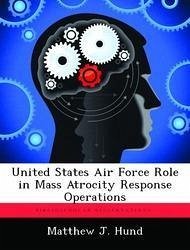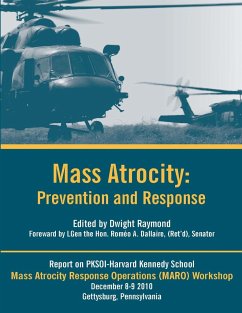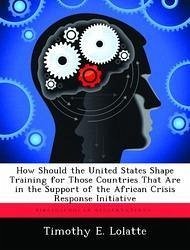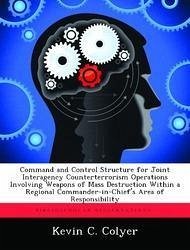Nicht lieferbar

United States Air Force Role in Mass Atrocity Response Operations
Versandkostenfrei!
Nicht lieferbar
Since 2006, there has been a shift in United States policy, advocating for the intervention and prevention of mass atrocities. This shift in policy provided the momentum for the Carr Center for Human Rights Policy and the Peacekeeping and Stability Operations Institute (PKSOI) of the U.S. Army War College to partner. This partnership established the Mass Atrocity Response Operations (MARO) project. This project's goals are to create a widely shared understanding of mass atrocities and to create a military approach to resolve them. One product of the MARO project was a military planning handboo...
Since 2006, there has been a shift in United States policy, advocating for the intervention and prevention of mass atrocities. This shift in policy provided the momentum for the Carr Center for Human Rights Policy and the Peacekeeping and Stability Operations Institute (PKSOI) of the U.S. Army War College to partner. This partnership established the Mass Atrocity Response Operations (MARO) project. This project's goals are to create a widely shared understanding of mass atrocities and to create a military approach to resolve them. One product of the MARO project was a military planning handbook, designed to be a planning guideline for military operations in MARO. The handbook's scope focuses on joint operational planning, and is thus, limited in nature. It does not cover in detail the role of air power in MARO. This paper answers the question, how does the United States Air Force best execute its role in MARO? The analysis reveals practical air power solutions to this problem. The paper examines the hypothesis by assessing the efficacy of Colonel John Boyd's A Discourse on Winning and Losing. Colonel Boyd's work on tactical and strategic isolation offers insights into the effects air power can have on the enemy, or the perpetrator-groups of mass atrocity. Next, the paper examines the current literature relative to MARO and provides key foundations and principles for combating mass atrocities. The paper then analyzes current Air Force doctrine and provides salient air power solutions to combat mass atrocities. Relevant air power solutions highlighted in this paper include Global Integrated ISR, Special Operations, Air Superiority, Global Precision Attack, and Rapid Global Mobility. Air power plays a significant role in the intervention of mass atrocity, once the National Command Authority decides to act. Thus, this paper recommends that geographic commands establish "off-the-shelf" plans for genocide-prone hot-spots around the world. These plans are crucial for two







